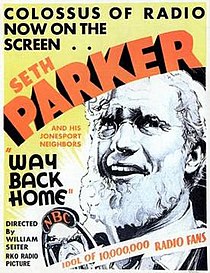Way Back Home (1931 film)
| Way Back Home | |
|---|---|

Theatrical release poster
|
|
| Directed by | William A. Seiter |
| Produced by | William LeBaron |
| Written by | Jane Murfin |
| Starring |
Phillips Lord Effie Palmer Frank Albertson Bette Davis |
| Music by | Max Steiner |
| Cinematography | J. Roy Hunt |
| Edited by | Arthur Roberts |
| Distributed by | RKO Radio Pictures |
|
Release date
|
November 13, 1931 |
|
Running time
|
81 minutes |
| Country | United States |
| Language | English |
| Budget | $400,000 |
Way Back Home is a 1931 American Pre-Code drama film directed by William A. Seiter. The screenplay by Jane Murfin is based on characters created for the NBC Radio show Seth Parker by Phillips Lord.
A decade earlier, Jonesport, Maine preacher Seth Parker and his wife took in motherless infant Robbie Turner after he was abandoned by his sadistic alcoholic father Rufe; young Robbie has always considered the Parkers his parents. Mary Lucy Duffy, whose father has banished her from their home for fraternizing with farmhand David Clark, is also living with the Parkers, and her romance with David attracts the attention of the local gossips. David's mother had run off with a stranger years earlier, and when she returned to Jonesport with an illegitimate infant son, they were shunned by the townspeople.
Mary Lucy and David plan to elope to Bangor, but Seth encourages them to stay by offering to pay for a proper wedding. Rufe breaks into the Parker home to kidnap Robbie, attacking Mary Lucy when she tries to protect the boy. Seth pursues Rufe and Robbie and manages to intercept them before they board a train. Because Seth is not Robbie's legal guardian, the boy is placed in an orphanage until a decision can be made about his future. Meanwhile, Seth lectures the townspeople about tolerance and implores them to accept Rose and her newlywed son and his bride. Robbie returns to Jonesport, having been legally entrusted to the Parkers' care.
Phillips Lord had created the character of preacher and folksy philosopher Seth Parker for a Sunday night series broadcast by NBC Radio. Its popularity led RKO Radio Pictures to purchase the film rights and assign Jane Murfin to write a screenplay with Parker and his wife as the central characters. Originally entitled Other People's Business, it drew criticism from a studio script reader, who thought the plot was dated and noted, "A story of this type should never take itself seriously, for the day when pictures like The Old Homestead [a 1915 Famous Players film focused on a popular New England vaudevillian] would grip the attention of a movie audience is lost forever." The reader cited the commercial failure of Check and Double Check, a 1930 feature inspired by Amos 'n' Andy, as proof radio shows did not necessarily adapt well for the screen, and noted most Seth Parker listeners were "those people who are interested in the singing of hymns, old folk songs, and a very simple brand of humor" and that the "average young person, between the ages of fifteen and thirty, who form a very large percentage of the movie audiences, do not listen to the broadcast." Despite the readers's misgivings, RKO supervising producer Pandro S. Berman greenlighted the project and budgeted it at $400,000.
...
Wikipedia
